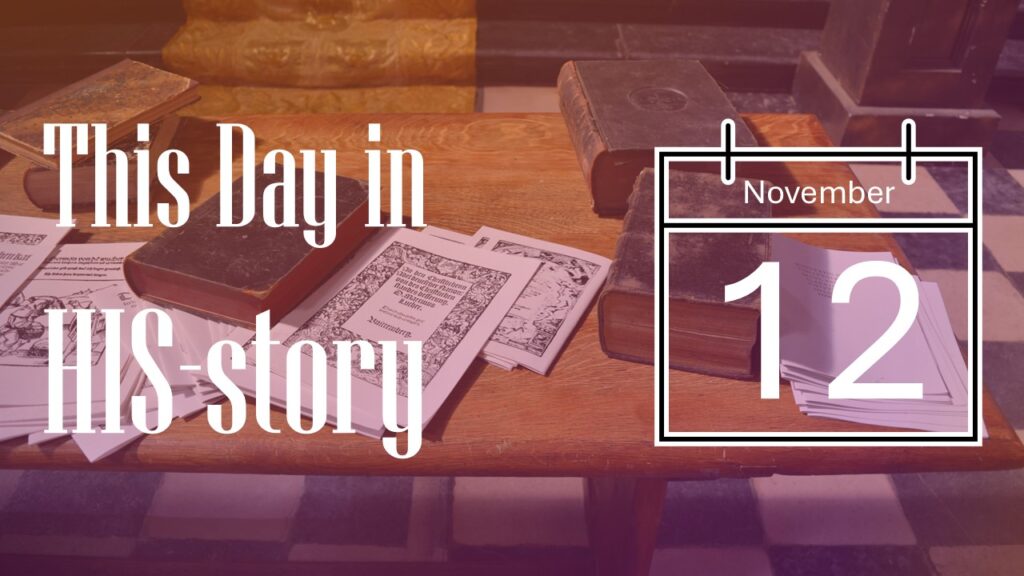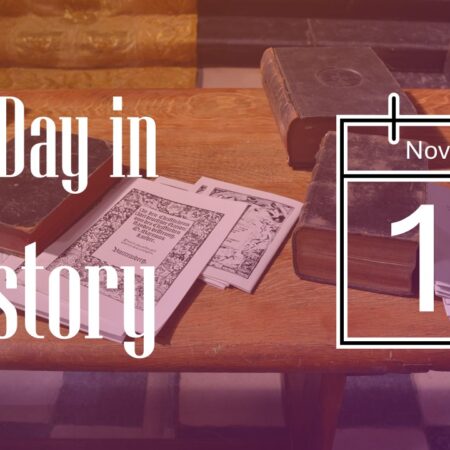
1660
John Bunyan is arrested for unlicensed preaching and sentenced to prison. During his various incarcerations, he will pen Pilgrim’s Progess and Grace Abounding to the Chief of Sinners, the greatest Puritan spiritual autobiography.

1704
Forty-two year old Matthew Henry writes in his journal that he means to prepare a commentary on the entire Scripture. A couple days later he adds, “I set about it, that I may endeavour something and spend my time to some good purpose and let the Lord make what use he pleaseth of me.” He will complete most of the project before his death in 1714. Friends will put it into final form and publish it.

1836
Have you ever wondered, as you approached communion, whether you were really prepared to take it or not? Perhaps your pastor warned you that anyone who eats or drinks unworthily eats and drinks damnation to himself. Charles Simeon was troubled by this very question.

He had gone up to Cambridge to study. Each student was required to attend chapel services and take communion. He wrote: “On 29 January 1779, I came to college. On 2 February I understood that at division of term I must attend the Lord’s Supper. The Provost absolutely required it. Conscience told me that, if I must go, I must repent and turn to God.”
Repent Simeon did, and became a zealous Christian. However, he was one of those who raise hackles because they seem harsh and self-assertive. The vicar of Trinity Church, Cambridge, died suddenly. The congregation wanted the assistant curate, Mr. Hammond, as their new vicar. When the bishop awarded the position to Simeon instead, Simeon faced serious opposition. The pews sat half empty because the people boycotted him. Simeon offered to resign but his bishop would not let him.
After that, he sometimes found the church locked against him. When it opened, the pew gates were locked. Simeon set up chairs at his own expense, but the trustees tossed them out. For twelve years the congregation chose other men to give the Sunday afternoon lectures. College students interrupted his services and passed evil rumors about him. He was so shunned that he wrote with amazement when a fellow of the school was not ashamed to walk with him for quarter of an hour.
In spite of this opposition, Simeon persevered. He preached directly from the Word of God, and gradually won some of the congregation to his side. Thirty years, later, however, he still faced elements of revolt.
Despite all this, Simeon became a leader of the Evangelicals in the Church of England. He helped bring into existence the British and Foreign Bible Society, the Religious Tract Society, the Church Missionary Society, and other influential Evangelical organizations. His spiritual influence on young Cambridge men over the decades is incalculable. By helping in the appointment of evangelical chaplains to India, Simeon encouraged the gospel’s spread in that country when the East India Company would not allow missionaries. Among his proteges was Henry Martyn, famed as a missionary and Bible translator.
Asked how he had endured his many afflictions, 71 year old Simeon replied, “My dear brother, we must not mind a little suffering for Christ’s sake. When I am getting through a hedge, if my head and shoulders are safely through, I can bear the pricking of my legs. Let us rejoice in the remembrance that our holy Head has surmounted all His suffering and triumphed over death. Let us follow Him patiently; we shall soon be partakers of His victory.”
The faithful pastor preached until two months before his death. On his deathbed, he said, “Do you know the text that greatly comforts me just now?” Friends asked him which. He replied, “I find infinite consolation in the fact that in the beginning God created the heaven and the earth!” That surprised them until he explained, “Why, if, out of nothing God can bring all the wonder of the world, He may yet make something out of me!” Simeon died on this day, November 12, 1836.
1942
HT: Christian History Institute
Kenneth MacRae was a notable minister in the Free Church of Scotland. His dictum was “Never preach a sermon which has not sufficient in it—used of the Spirit—to lead a soul to Christ.” His concern was that the old Presbyterian faith was being eroded, and he sought to educate the rising generation in orthodox principles. He kept a highly regarded diary. Here is an entry for this day, 12 November 1942, at the height of World War II.
“At present the general aspect of the war situation seems distinctly promising. Everywhere the trend of events seems to have turned against our enemies. The Americans are consolidating their position in Morocco and Algeria and have received permission from the Bey of Tunisia to march through to Libya. The German attacks upon Stalingrad and the Caucuses have all been halted. The Japanese are still falling back in New Guinea and seem to be getting the worst of it in the Solomons. Italy is as good as off the map. Hitler’s horizon is darkening. May the Lord end it all soon!”
